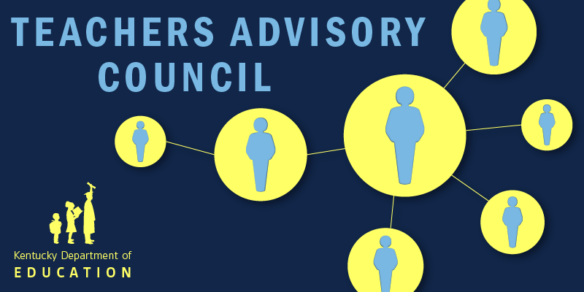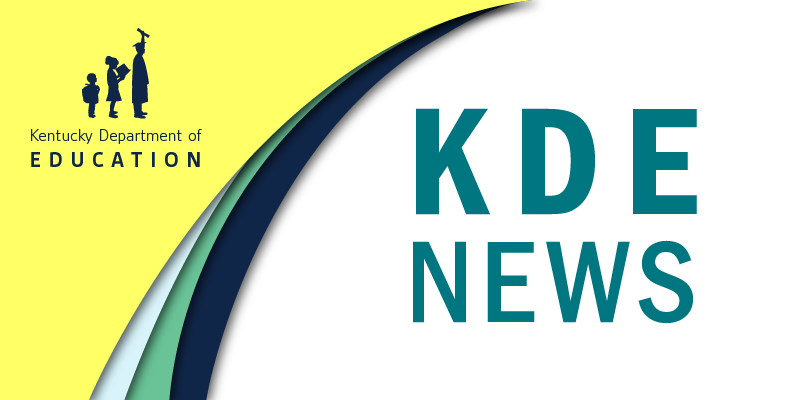 (FRANKFORT, KY) – Representatives with the Kentucky Department of Education’s (KDE’s) Division of Innovation met with members of the Teachers Advisory Council to discuss the Portrait of a Learner and defenses of learning during the Teachers Advisory Council meeting on June 10.
(FRANKFORT, KY) – Representatives with the Kentucky Department of Education’s (KDE’s) Division of Innovation met with members of the Teachers Advisory Council to discuss the Portrait of a Learner and defenses of learning during the Teachers Advisory Council meeting on June 10.
Portrait of a Learner is an agreed-upon set of school- or district-level aspirations for what every learner should know and be able to do when they leave school. Student defenses of learning are performance-based assessments that mimic real-life situations – such as work presentations – and provide an authentic deadline and audience to demonstrate their competency with these aspirations. Typically, students discuss several aspects of their education, ranging from details about their lives to what they’ve accomplished in school.
Rob Collins, KDE innovative programs consultant, said more than 150 school districts in Kentucky have begun work on developing their own portraits with input from a variety of stakeholders: community members, parents, students, teachers and business leaders.
“Districts are seeing the value of this work,” Collins said.
The proactive work began with the Local Laboratories of Learning – a partnership between KDE, the Kentucky Board of Education, the Ohio Valley Education Cooperative and the University of Kentucky Center for Next Generation Leadership – on innovative systems for student assessment and accountability.
Robert Meacham, KDE innovative programs manager, said the work has grown and many districts are beginning to explore defenses of learning across different grade levels.
“We have districts that are taking this into what is becoming a really vibrant learning experience for their students,” Meacham said.
The work aligns with what KDE and the Kentucky United We Learn Council have been working on for years: revamped assessment and accountability systems that reflect the United We Learn vision of vibrant learning experiences, innovation in our schools and collaboration with the community.
The Kentucky United We Learn Council, which is comprised of a wide-ranging group of people – families, students, educators, legislators, business leaders and community members – has contributed to the development of a series of assessment and accountability model frameworks, incorporating information and data gathered by the Local Laboratories of Learning.
The work also included nine regional town halls KDE hosted earlier this year, with more than 600 people attending to give their feedback on the proposed framework. KDE also sought input from a variety of stakeholders and advisory groups, including the Kentucky Board of Education.
Shara Savage, KDE education administration program manager, presented the latest framework, Framework 4.0, which centers around local accountability indicators and state accountability indicators that meet federal requirements.
The local accountability indicators provide flexibility for schools and districts. Local indicators can include interim assessments in reading and math, off-grade science testing, and locally determined measures. Additionally, there are required components, such as vibrant learning experiences, writing and social studies; however, districts can choose how to implement them based on the district’s local context and needs.
The state accountability indicators, which meet federal requirements, include summative performance in reading and math, individual student growth, transition readiness, graduation rate, English language progress, and the climate and safety survey. The science assessment is included and must utilize a statewide measure; however, districts can also add locally developed components for local accountability.
More information about the current framework and the Kentucky United We Learn Council’s timeline can be found on KDE’s Reimagining Assessment and Accountability webpage.
Megan Hall, a Teachers Advisory Council member from Letcher County, asked how the defenses of learning would fit into the new framework, voicing concerns about the potential for too much testing. Meacham said the defenses would be an option within the local accountability portion, “a best practice you can do to show that your students are meeting the competencies of your portrait.”
Meacham addressed other questions about the role defenses would play in assessments, pointing to districts where students only conduct defenses of learning for specific subjects instead of across the board as an example of how districts adapt the idea to fit their model.
In other business:
- Elly Gilbert, assistant division director in the KDE Office of Educator Licensure and Effectiveness, discussed the most recent Impact KY Working Conditions Survey and how to address teacher wellbeing; and
- Brian Perry, KDE director of government relations, provided an update on legislation passed during the 2025 regular session, including recent legislative guidance from KDE.




Make America great and equal